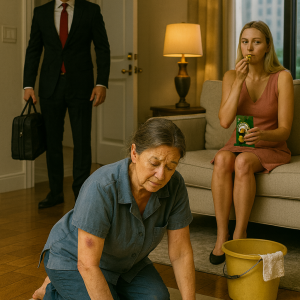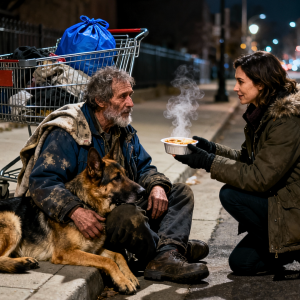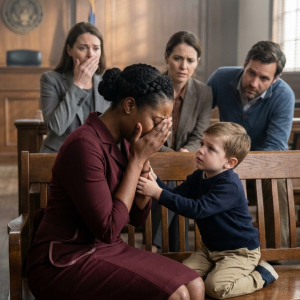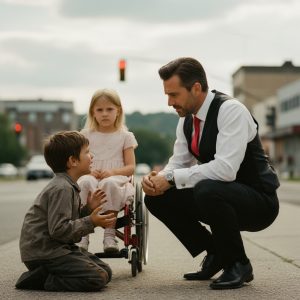
Sometimes, life changes with just one sentence. Not a scream, not a dramatic declaration—just a flat, almost casual phrase from the person you love most. It pierces deeper than any knife. And when it hits, you either crumble or rise, trembling yet unbroken.
For David Turner, sixty-eight and widowed for over two decades, routine was his refuge. Morning walks in suburban Portland, a steaming cup of coffee, a few crossword puzzles, and phone calls to his only son, Ethan. Life was simple, predictable, until the evening Ethan came by, hands shoved deep into his jacket pockets, eyes avoiding his father’s.
“Dad,” Ethan said, voice stripped of warmth, “you can’t stay with us anymore. There’s… no space for you.”
David blinked, as if he hadn’t heard right. “No space?” he asked quietly.
“It’s not just that,” Ethan muttered. “Sophie thinks it’s too much. The kids need their own rooms. You’ll be fine. You’re… independent.”
Independent. The word landed like a stone.

David swallowed the bitterness rising in his throat. Years of sacrifices—late-night shifts, empty bank accounts, holidays spent working so Ethan could have more—seemed to vanish with that one sentence. But he didn’t beg. He didn’t rage. He simply nodded.
“All right,” he said, his voice calm, though his heart cracked.
That night, he packed his few belongings into two suitcases. The old brown coat he had worn for decades hung on the chair. Inside its lining, hidden from the world, was something no one knew about: a wad of bills, carefully saved over the years. His secret lifeline. His dignity.
With those savings, David could have vanished. Florida, Arizona, even Mexico—he could have gone anywhere. But he didn’t run. Instead, he looked at his own pain and decided to transform it.
A few months later, in a quiet corner of Seattle, a new sign appeared on a narrow street:
Silver Haven
The letters shimmered softly under the rain. Inside, the place smelled of chamomile, bergamot, and warm bread. It wasn’t just a tea shop. It was a sanctuary. The walls were lined with photos of sunsets, shelves stacked with old books, and armchairs that seemed to hug you when you sat down. David opened Silver Haven for those who, like him, had been pushed to the edges—retirees, widowers, grandmothers forgotten by their children, men and women whose stories no one wanted to hear anymore.

“Here,” David would tell his guests with a gentle smile, “you matter. Sit. Tell me your story.”
And they did. Over steaming cups of lavender tea, they shared heartbreak, laughter, memories of lost loves, and dreams they still carried.
One rainy afternoon, as David wiped down the counter, the bell over the door chimed. He looked up—and froze.
“Dad,” Ethan said, standing in the doorway, hair damp, eyes restless. “I… I heard about this place. I shouldn’t have…I mean, I was wrong.”
David set down the cloth, his hands steady. “Why are you here, Ethan?”
“I wanted to see you. Maybe… we could talk. Maybe you could come back home.”
For a long moment, the only sound was the rain tapping against the windows.
David’s expression softened, but his voice remained firm. “No, Ethan. Not this time. I’ve built something here. Something that’s mine. You made your choice. And I made mine.”

Ethan’s shoulders sagged, a boy again before his father. “I’m sorry,” he whispered.
David walked over, placing a hand on his son’s shoulder. “I forgive you,” he said gently, “but forgiveness doesn’t mean I’ll go back to being invisible. My life is here now. I matter here.”
Silver Haven flourished. Word spread, and soon the tea room became a place where lost souls found warmth. David’s quiet revenge wasn’t anger or bitterness—it was joy. Joy in every smile, every story shared, every hand held across the table.
Sometimes, the strongest response isn’t a shout or a fight. Sometimes, it’s creating a place where you can finally breathe, finally shine.
And every evening, as the sun dipped below the horizon, David brewed himself a cup of jasmine tea and whispered to the empty room, “I’m still here. And I’m free.”





